For many people, January is a time to make New Year Resolutions. These can be anything and everything, and even a lot of children and young adults strive to make changes to their day-to-day lives. So, whether you or your child has decided to be healthier this year, make sure you both have the right attitude and outlook on what being healthy means.
Inner Beauty
For most kids, they are going to be enamored by all the celebrities and all the stars they follow on social media, and are striving to become like them every day. This is not necessarily a bad thing, but it does vary depending on how they want to become these stars. Do they want to be more adventurous like these stars, or more active? That is a good thing! But if your children think they need to change themselves, their identity, or their looks, then you need to sit down and have a conversation with them.
Even adults struggle with finding themselves and often turn to New Years Resolutions as a way to make them into something they are not. This in turn ends their New Years Resolution pretty quickly as most people are not able to completely change themselves overnight, or at least not in the long term. And nobody should! So, if your child is thinking the latest fad diet or beauty trend is going to make them “healthier” then you may want to keep a closer eye on what they are watching and help them make better life choices moving forward.
Real Nutrition
If your kid does want to implement more healthier choices into their life, good for them! This may translate to adding more healthy foods into their diet, or even a completely new diet altogether! Some children may want to cut out certain foods or increase or decrease others, and you will want to make sure they are still receiving the nutrients they need. For most, a vegetarian or vegan diet is perfectly healthy, just make sure they are not eating more junk food based vegan food as these are becoming more predominant in grocery stores. It is basically the same rules as for any diet, even a more “traditional” diet; less junk food and more whole foods, like fruits, vegetables, starches, and meats (whether that is actual meat or soy).
Make sure your children understand that everybody comes in all shapes and sizes, and that they should not be comparing themselves to others. Everyone is unique and they should embrace themselves for who they truly are, and that is the absolute healthiest they can be!
Katie Kyzivat

